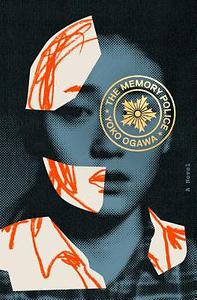Take a photo of a barcode or cover
emotional
reflective
slow-paced
Plot or Character Driven:
A mix
Strong character development:
No
Loveable characters:
Complicated
Diverse cast of characters:
Yes
Flaws of characters a main focus:
No
dark
tense
medium-paced
Strong character development:
Yes
dark
reflective
tense
slow-paced
Plot or Character Driven:
A mix
Strong character development:
No
Loveable characters:
Complicated
Diverse cast of characters:
Yes
Flaws of characters a main focus:
No
Strange and beautiful story. I expected to learn more about the world than we did. It was this slow acceptance of an awful fate, and it is sad because aren’t we all living that somewhat? It isn’t so much what disappeared but the power and agency that went with each object.
The book started out with a lot of promise but the end was too allegorical and abruptly brought. The story lacks a lot of important backgrounds and felt solely being driven by the Memory Police and sudden disappearances.
With the premise of any other dystopian novel (that I always find intriguing, not gonna lie), tricks you into thinking that this is another illustration of the dehumanization perpretrated by yet another totalitarian environment.
But this is not what this book is really about.
There is no hero targeted by the system.
There is no longing to stop it either.
Just a fearful, yet gentle, look into the itself fading humanity of an ordinary protagonist.
The whole novel had me on the edge of my seat, waiting for them to be found by the Memory Police, or for our protagonist to start regaining her memories.
But nothing of the sort ever happens.
Instead we get a beautiful existentialistic reflection of her own condition, and the slow-paced acceptance of her destiny.
But this is not what this book is really about.
There is no hero targeted by the system.
There is no longing to stop it either.
Just a fearful, yet gentle, look into the itself fading humanity of an ordinary protagonist.
The whole novel had me on the edge of my seat, waiting for them to be found by the Memory Police, or for our protagonist to start regaining her memories.
But nothing of the sort ever happens.
Instead we get a beautiful existentialistic reflection of her own condition, and the slow-paced acceptance of her destiny.
mysterious
sad
slow-paced
Plot or Character Driven:
Character
Strong character development:
Complicated
Loveable characters:
Yes
Diverse cast of characters:
No
Flaws of characters a main focus:
No
This is a weird one to review. The premise is cool, but the execution somehow felt flat even though the writing is enjoyable. It wasn't bad, but nothing particular stood out to me either.
challenging
dark
mysterious
medium-paced
Plot or Character Driven:
A mix
Strong character development:
No
Loveable characters:
Complicated
Diverse cast of characters:
Complicated
Flaws of characters a main focus:
Yes
Musical Pairing: Piano Music, Toru Takemitsu performed by Kotaro Fukuma
Warning: Spoilers ahead. They are hidden behind the blocked text, click at your own risk.
This book makes me angry. Not at Yoko Ogawa or her rich, strangely familiar, and beautifully alluring world. Not even her very flawed characters (though there are some that will not escape my wrath). It's the systems of oppression in this book, both interpersonal oppression and oppression on a societal level, that absolutely enrage me. And that, I think, is the power of this book.Perhaps it's because I've recently seen Les Miserables at time of writing, but I really wanted this book to end in revolution. I am, however, glad it did not.
This book also confounds me. Because as fascinating and deeply explored as the premise is, I ended up finding it contrived. The balance of the real and the surreal, while beautifully written and engaging to read, made the impact of the novel's metaphor - it's thesis, as my high school English teacher would say - confusing and hard to decipher.And the parallel narrative that emerges in the protagonist's own writing becomes thornier and thornier to relate to the main events of the novel as it progresses.
Perhaps that confusion is the point. Perhaps the point of the novel is to sit between the real and the surreal. Perhaps that what an all-powerful authoritarian regime forces it's subjects to sit in, day after day. But in this novel, especially one poised to be as powerful as 1984 or Fahrenheit 451, I for some more clarity.
Will that stop me from recommending The Memory Police as a read? Absolutely not. I think above all else that Ogawa's intention is for us to grapple with these exact questions. It will occupy the same space as those works of Orwell and Bradbury I mentioned, and I hope that everyone reads these three novels as counterpoints to each other. By doing so, maybe we'll even see the memories disappearing around us today.
Warning: Spoilers ahead. They are hidden behind the blocked text, click at your own risk.
This book makes me angry. Not at Yoko Ogawa or her rich, strangely familiar, and beautifully alluring world. Not even her very flawed characters (though there are some that will not escape my wrath). It's the systems of oppression in this book, both interpersonal oppression and oppression on a societal level, that absolutely enrage me. And that, I think, is the power of this book.
This book also confounds me. Because as fascinating and deeply explored as the premise is, I ended up finding it contrived. The balance of the real and the surreal, while beautifully written and engaging to read, made the impact of the novel's metaphor - it's thesis, as my high school English teacher would say - confusing and hard to decipher.
Perhaps that confusion is the point. Perhaps the point of the novel is to sit between the real and the surreal. Perhaps that what an all-powerful authoritarian regime forces it's subjects to sit in, day after day. But in this novel, especially one poised to be as powerful as 1984 or Fahrenheit 451, I for some more clarity.
Will that stop me from recommending The Memory Police as a read? Absolutely not. I think above all else that Ogawa's intention is for us to grapple with these exact questions. It will occupy the same space as those works of Orwell and Bradbury I mentioned, and I hope that everyone reads these three novels as counterpoints to each other. By doing so, maybe we'll even see the memories disappearing around us today.
Graphic: Domestic abuse, Police brutality, Gaslighting
Moderate: Sexual assault
dark
mysterious
sad
medium-paced
dark
mysterious
reflective
sad
tense
slow-paced
Plot or Character Driven:
Character
Strong character development:
No
Loveable characters:
Complicated
Diverse cast of characters:
No
Flaws of characters a main focus:
No






